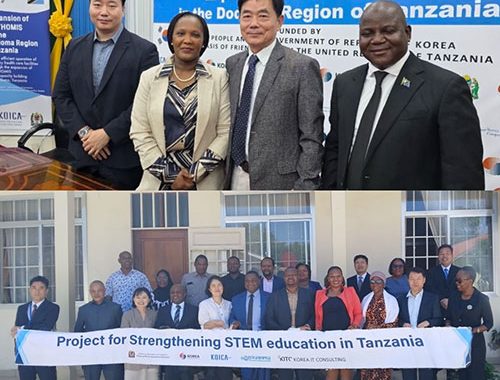To improve STEM learning environments at 13 model secondary schools in Dodoma and Simiyu, KOICA is collaborating closely with the President’s Office – Regional Administration and Local Government (PO-RALG) and the Ministry of Education, Science and Technology (MoEST). The initiative, which has a USD 10 million investment, intends to raise the standard of science and ICT education, boost participation, especially among girls and develop instructors’ and students’ digital skills.
The Government of Tanzania Health Operations and Management Information System (GoTHOMIS) is being expanded throughout the eight districts of the Dodoma Region with assistance from KOICA. The project’s main goal is to digitise primary healthcare facilities, which provide services to most Tanzanians. In order to improve patient care and system efficiency, it involves installing ICT infrastructure, enhancing the skills of healthcare professionals and sharing data in real time.
Together, these programs demonstrate KOICA’s dedication to empowering communities in Tanzania’s most important public sectors via digital innovation and inclusive, sustainable development.
This initiative’s Project Action Officer, Song Jeonghoo, sees it as more than just infrastructure—it’s personal. He said, “I’ve always wanted to help bring about significant change.” “Working directly with Tanzanian communities and supporting students who deserve better opportunities in science and technology was made possible by this project.” His love of cross-cultural cooperation and sustainable development led him to Tanzania, where he is currently observing the results of his labour firsthand.
According to Jeonghoo, “these labs give students crucial access to real-world, hands-on learning.” “Educators can now present more engaging and dynamic lessons, incorporating real-world science into repetition techniques.” Communities have already shown excitement and school administrators have hailed the effort as a game-changer, even if full implementation is still proceeding.
KOICA’s strategy places a strong emphasis on gender inclusiveness. In order to address the gender gap in STEM areas, the project includes gender-responsive interventions such as mentorship programs with female role models, STEM clubs and science competitions that encourage equitable participation. Jeonghoo underlined that encouraging girls to study science is a priority rather than an afterthought. “All girls should envision themselves behind a computer, in a lab coat, or spearheading innovation.”
The reaction from the community has been very positive. The idea that these chances can change the future of girls in rural Tanzania is becoming more and more popular among parents, educators and students. Even though the project is still in its early stages, young students are already demonstrating obvious enthusiasm.
KOICA is investing in people in addition to infrastructure. In order to strengthen national policy, senior Tanzanian education officials have received advanced STEM training in Korea. Additionally, a multi-phase training program is being developed to provide teachers with digital tools, gender-sensitive teaching strategies and real-world scientific applications.
According to Jeonghoo, “STEM is about solving problems, improving lives and building national capacity; it’s not just about equations or computers.” In his ideal future, Tanzanian students—particularly female students—will view STEM as an approachable route to achievement and creativity rather than as a discipline reserved for the privileged.
Tanzania’s scientific and technological future appears brighter with KOICA’s unwavering support—one lab, one instructor and one student at a time.
In addition to providing Tanzania’s youth with digital skills through revolutionary investments in STEM education, KOICA is updating the country’s healthcare system to guarantee that digital innovation enhances daily life at the local level.
Working on the GoTHOMIS expansion project has been a very meaningful experience for Field Manager Eunson. “One of the most direct ways to improve lives is through healthcare,” he stated. “After learning about Tanzania’s government’s digital health initiatives, I was confident that KOICA could help bring about long-lasting change, particularly in primary healthcare, where more than 65% of people receive care.”

